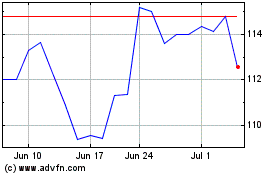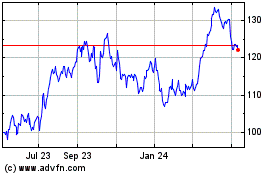House Votes to Lift Oil-Export Ban
October 09 2015 - 2:10PM
Dow Jones News
WASHINGTON—The House voted Friday to lift the 40-year-old ban on
oil exports, fueling a clash with President Barack Obama, giving
the oil industry one of its top congressional priorities and
shifting the focus to the Senate, where the measure faces steep
hurdles to passage.
The House voted 261-159 to lift the ban that Congress first put
in place after the 1970s Arab oil embargo that sent domestic
gasoline prices skyrocketing.
More than a dozen oil companies, including Continental Resources
Inc. ConocoPhillips, and Encana Corp., have been pressing the issue
with Congress for more than a year.
They argue that allowing oil exports would eliminate market
distortions, create jobs and stimulate more U.S. petroleum
production, which has increased 80% since 2008 and has helped drive
down the global price of oil to half of what it was in summer
2014.
U.S. oil exports to most foreign countries and in most instances
are banned under the 1970s-era policy. Lifting the ban would help
companies fetch a higher price on the global oil market.
"An extra dollar or two for the price of our product today is
very important because our margins are incredibly squeezed," said
Doug Suttles, CEO of Encana, a Calgary, Alberta-based company that
pumps oil and gas in the U.S.
The White House has threatened to veto the bill, saying in a
statement Wednesday that the it "is not needed at this time" in
part because some studies project the impact of lifting the ban to
be limited, Energy Secretary Ernest Moniz told Congress earlier
this week. The White House also said instead that Congress should
"be focusing its efforts on supporting our transition to a
low-carbon economy."
The measure's prospects in the Senate are less certain, in part
because of the White House's opposition. Two Senate committees have
approved similar measures lifting the ban, but few Senate Democrats
appear willing to engage on the issue, and Senate Majority Leader
Mitch McConnell (R., Ky.) hasn't shown a willingness to move
similar legislation to the floor.
The House vote on Friday, and the broader debate in Congress
about changing the decades-old policy, could also have an impact on
markets, already experiencing volatility fueled by a glut of supply
and weaker-than-expected demand in Asia.
Due in part to a U.S. oil boom over the last decade, the monthly
average price for a gallon of gasoline in September—$2.46—is the
lowest such average for that month since 2004, according to
government data.
Some refineries with business primarily in the U.S. and consumer
groups oppose oil exports, saying they could raise gasoline prices
for U.S. drivers. Many environmental groups also oppose lifting the
ban, arguing that doing so could further stimulate production of
fossil fuels.
"Lifting the oil export ban is a giveaway to the oil industry
that would undermine the progress our country is making to use more
clean energy and fight climate change," said Franz Matzner,
director of the Natural Resources Defense Council's anti-oil
initiative.
Exporting oil was unthinkable to most energy industry experts
until the past couple of years as U.S. production has increased.
Support on Capitol Hill also has been growing faster than many
observers thought, given concern about how exporting oil could, or
could be perceived to, raise gas prices.
The U.S. Energy Information Administration in September found
that exporting oil would actually not increase gas prices and could
even help lower them.
In response to industry requests, the Obama administration has
taken some initial steps in the past year to ease the growing glut
of domestically produced oil. Last year, the Commerce Department
began allowing companies to export ultralight oil after minimal
processing, and in August it said it would begin allowing companies
to exchange U.S. crude with Mexico.
The U.S. is also already exporting more than a half-million
barrels of crude a day to Canada, the biggest exemption under the
ban. That is 14 times as much as in 2007, but still just roughly 5%
of U.S. oil produced every day.
Backers of the effort in the House, including Speaker John
Boehner (R., Ohio), and House Energy and Commerce Committee
Chairman Fred Upton (R., Mich.), added a provision to the bill late
in the legislative process authorizing the Defense Department to
boost payments to the shipping industry as a way to entice "yes"
votes from Democrats who would be more likely to listen to shipping
companies and their unions than the oil industry.
During floor debate on the bill, the House rejected an amendment
that would have stripped the maritime provision from the bill and
adopted two others, one that would prohibit U.S. oil exports to
Iran and another that would prohibit the exports to any state
sponsors of terror.
Write to Amy Harder at amy.harder@wsj.com
Subscribe to WSJ: http://online.wsj.com?mod=djnwires
(END) Dow Jones Newswires
October 09, 2015 13:55 ET (17:55 GMT)
Copyright (c) 2015 Dow Jones & Company, Inc.
ConocoPhillips (NYSE:COP)
Historical Stock Chart
From Mar 2024 to Apr 2024

ConocoPhillips (NYSE:COP)
Historical Stock Chart
From Apr 2023 to Apr 2024
